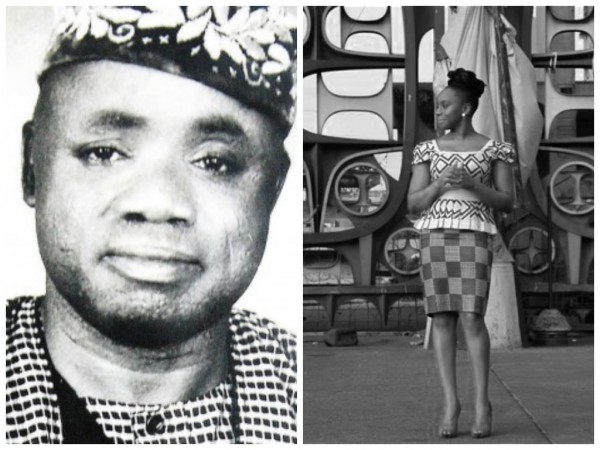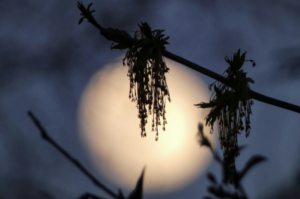It was raining the afternoon Chimamanda had the extraordinary experience of meeting a Nigerian novelist long dead. She had just found a place to hide from the rain and was frantically searching her handbag for her phone so she could check for new posts on Bellanaija. Just then she felt a tap on her shoulder, followed by an intensely tingly feeling that she would later recall as waves of shivers coursing through her body. Even before she turned around and saw him, she knew right away that whatever it was that touched her was not from this world. The wet and muggy night suddenly felt icy cold. Fagunwa’s ghost took one of the three garden chairs in the canteen and motioned for her to do the same, which she did. He said he had stopped by for a quick chat. Chimamanda knew who he was. Who doesn’t? That same moment, Dickens’ Ebenezer Scrooge and his ordeal with the ghosts of Christmas past flashed through her mind and made her slightly nervous. But then it’s Chimamanda, the iron lady of contemporary African fiction. Nothing has been known to ruffle her feathers. Calm and confident, she replies:
Chimamanda: Good evening sir.
Fagunwa: How are you my daughter?
Chimamanda: Fine, thank you.
Fagunwa: To tell you the truth, Nigeria hasn’t changed much since the 60s.
Chimamanda: You’re joking, right? A president from a minority ethnic group, a Nobel Laureate, P Square, a Nigerian Sebald?
Fagunwa: Just look at Nigerians. The lost look on their faces. Literary austerity—that’s what I call it—an aching, scraping hunger for a ridiculously delicious novel.
Chimamanda: I’m not sure I understand you sir.
Fagunwa: I didn’t expect you to understand me.
Chimamanda: Maybe you haven’t read my novels. New York Times said the first one…
Fagunwa: [cuts her off] I know what your novels are…Well, I didn’t really read them. Achebe told me about them the last time we hung out.
Chimamanda: Okay?
Fagunwa: My dear, listen to me. You think that because you lived in Achebe’s house in Nsukka, his genius robbed off on you. Let me…
Chimamanda: You are being rather mean. No? By the way, what novel did you even write? Forest of a Thousand Demons. Isn’t that supposed to be a children’s fable?
Fagunwa: Fable ke…a fable without animal characters?
Chimamanda: But you know what I mean. Forest of a Thousand Demons is fabulous. It’s not about real things. Aren’t there like creatures, shape-shifting, spells, juju, spirits, an enchanted forest? The thing is I’m a respectable, card-carrying African novelist. I like things a tad realistic.
Fagunwa: Is Spencer’s Faery Queen a fable? Is the story of how Ogun bridged the abyss between gods and men…
Chimamanda: [cuts him off] Look we can fight about what a fable is or is not but what remains a fact is that Forest of a Thousand Demons is not a novel and can never be a novel.
Fagunwa: So? [laughs and shakes head] This generation of African writers are something. I blame Achebe for writing such a beautiful novel that you all have squandered the last 60 years trying to imitate.
Chimamanda: [standing up] I think I’ll take off now. Looks like the rain has stopped.
Fagunwa: Is it something I said?
Chimamanda: You have been borderline insulting and…never mind. I don’t want to say anything I’ll regret…Look, there’s really no point in fighting with a ghost. You’re not even real.
Fagunwa: Sit back down. Get it all out. Say what’s on your mind. Insult me, if you will. After all, I’m a ghost. I’m not real. Don’t forget you’re the realist here.
Chimamanda: [Sits back down] Okay. Take Amos Tutuola for example. The Palmwine Drinkard. What’s that thing? I mean…the text is a monstrous creature in itself. What am I supposed to do with it? How did we go from Tutuola to Achebe? And, of course, your fables…
Fagunwa: They’re not fables.
Chimamanda: Okay. Your…See? I don’t even know how to categorize it. Forest of a Thousand Demons is a lovely read, but I have to admit…I could never write like that and don’t even know that I want to.
Fagunwa: You know what’s missing from African writings these days?
Chimamanda: [she shakes her head]
Fagunwa: Achebe wanted to teach the reader. Soyinka wanted to enlighten. Ngugi wanted to free them. Teju Cole wants to impress them. Even you with your hair campaign. [Chuckles] I recall Flora Nwapa being quite peeved at Marachera for calling your most recent novel “Natural Hair for Dummies.” [laughs] But really, when will an African writer just write to give the reader a hell of a good time?
Chimamanda: It’s not that I set out to teach people through my novels. What do I know? Are we not all learners? I know many other African writers feel the same way. The whole idea of a writer as a swashbuckling hero ready to use the sword of cultural enlightenment to free Africans imprisoned in a colonial mindset was of a certain time. Do African writers today brand themselves that way? I don’t think so. But then again…[sighs]. Look, it’s complicated.
Fagunwa: Why do people read your work?
Chimamanda: Because they love it?
Fagunwa: No.
Chimamanda: [Rolls her eyes]
Fagunwa: They are drawn to your work but…No…Love is not the word I’ll use. Your novels are edifying. They are not lovable.
Chimamanda: “Your novels are edifying”…Sounds like a backhanded compliment.
Fagunwa: Take it however you want. But your work is certainly not lovable?
Chimamanda: What does it mean anyway…for a novel to be lovable.
Fagunwa: It’s hard to say. You could say it’s a feeling, a sense you get from a work that bewitches the reader, holds the reader in some kind of spell. It is common with books that make no claims or demands on the reader to be edified, taught, informed, cautioned, and so on. It transcends the highbrow/lowbrow division. In the realm of lovability, there is no difference between Things Fall Apart and 50 Shades of Grey.
Chimamanda: Hmm.
Fagunwa: Can I ask ask you a question?
Chimamanda: [Chuckles] You’ve not asked for my permission to say all the things you’ve said, why start now?
Fagunwa: What made you write a story about someone like Eugene?
Chimamanda: You mean Purple Hibiscus?
Fagunwa: A dictator, an abusive father, an murderous mother, an imprisoned son, a scarred girl, a broken family. Should I go on?…I mean…
Chimamanda: I guess it’s reality.
Fagunwa: Is that it? You write things because they are real? What’s so special about reality?
Chimamanda: People need to know what’s going on.
Fagunwa: People go to newspapers for that.
[No answer]
Fagunwa: You still haven’t answered me. What is so special about reality that we take it for granted that writers must be beholden to it?
[No answer]
Fagunwa: Achebe and Ngugi got you guys on this realism high. The funny thing is that Achebe made his name writing novels that we can’t entirely say are realist, at least not in the hardcore Dickensian realist sort of way—Things Fall Apart, The Arrow of God. The more realist he became, the more he lost his charm.
Chimamanda: The appeal in writing about reality could also just be that authors assume that readers are drawn to what is familiar to them.
Fagunwa: Maybe so. But there is a fine line between familiarity and banality. Don’t you find reality boring? Why would I want to read a story that is essentially a repackaged version of my own life? I am already living it! Stories are supposed to take me someplace unrecognizably strange where I can wander and get lost.
Chimamanda: And where would that be?
Fagunwa: Phantasia novels…Something I call phantasia novels.
Chimamanda: What’s that?
Fagunwa: I can’t stay much longer. Read the short essay I wrote in Teacher’s Monthly in 1960. I explained it there.
Chimamanda: Teacher’s what? It’s 2013. Where am I supposed to find that?
Fagunwa: HERE.
[Fagunwa stands up and takes a few steps but stops suddenly and walks back.]
Fagunwa: Let me leave you with a prophecy. After all, what sort of ghost would I be if I didn’t say something profound about the future? Here it goes:
The great African novel will come. But it will not come from writers who insist on writing stories that mirror an African reality that they have reduced to a set of social issues. It will not come from the Afropolitan generation who mistake affluence for worldliness. It will not come from realism because Africans do not like the cannibalism of being fed repacked versions of their own lives. It will come from a mind that understands what the people want, their deepest darkest fears, the archetypes that shape their dreams, the past they’ve placed beyond memory and that has for that reason become their future, their delirious present, their sadness and their fantasy. A mind that imagines a story that is an alchemy of all these, that creates out of these something strange and beautiful, something that Africans understand whether the rest of the world gets it or not, a story that Africans can hold up as a mystery that dissolves their differences. That mind is the African writer to come, the messiah that, like other messiahs, “will only arrive when we no longer need him.”
Farewell my daughter. By the way, congrats on Americanah. While I have my opinions about the book, be rest assured that I and all the other literary ancestors are doing all we can to make sure it sells well.
Feature Image by Sheena Rose










albert attah agada October 11, 2016 16:37
..